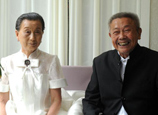
BEIJING, July 5 (Xinhua) -- While China and Russia are beginning their first joint naval exercises in the Sea of Japan on Friday, it was reported that the United States and Japan became nervous and sent surveillance planes and warships to monitor the drill.
The week-long drill is a routine naval exercise. Both sides have announced that it is not targeting any third party.
It is true that this is the first time for China to send a naval fleet to Russian sea waters to participate in a drill, but just as the Chinese side has put it: it would by no means imply any change in China's defense policy. Therefore, the United States, Japan and other Western countries should not fret about it.
According to Yang Junfei, commander of the Chinese fleet participating in the drill, the exercises have three objectives -- to consolidate the China-Russia comprehensive strategic partnership and elevate the level of strategic coordination for both countries, to strengthen the strategic trust between the armed forces of the two countries and deepen their practical cooperation, to make a practical drill on commanding coordination of joint military actions by Chinese and Russian navies so as to improve their capacity to jointly tackle maritime challenges and security threats.
It is true that the drill comes at a time when tensions are still there over an island dispute between China and Japan and when China's first aircraft carrier has just gone into service.
However, compared to the U.S. and Japanese navies, China's maritime power lags far behind.
As for the row over the Diaoyu Islands, it was Japan's unilateral move to "buy" the islands that had plunged the two nations' relationship into historically lows in decades.
Yet the Japanese government is still trying to deny the nation's history of aggression and even intends to challenge the post-war world order.
What is more detrimental to the already perilous situation in East Asia is that the United States has repeatedly conducted military exercises with Japan, the Philippines and other countries in the region.
For one thing, the United States and Japan staged a joint drill to recapture an island earlier this year when tension over the Diaoyu Islands was at its very height.
By doing that, Washington was sending a wrong signal to its allies in the region that no matter how provocative they might be, Uncle Sam would always be on their side.
Instead of nerves over the China-Russia joint war games, the United States and its allies in the region should seriously review their policies.
















 'Prince's cool idea in summer': Carving on watermelon to boost sales
'Prince's cool idea in summer': Carving on watermelon to boost sales


![]()
